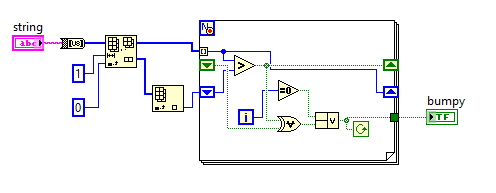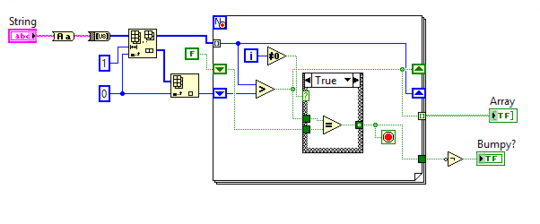31
4
(inspired by this challenge over on Puzzling -- SPOILERS for that puzzle are below, so stop reading here if you want to solve that puzzle on your own!)
If a letter in a word occurs alphabetically later than the previous letter in the word, we call that a rise between the two letters. Otherwise, including if it's the same letter, it's called a fall.
For example, the word ACE has two rises (A to C and C to E) and no falls, while THE has two falls (T to H and H to E) and no rises.
We call a word Bumpy if the sequence of rises and falls alternates. For example, BUMP goes rise (B to U), fall (U to M), rise (M to P). Note that the first sequence need not be a rise -- BALD goes fall-rise-fall and is also Bumpy.
The challenge
Given a word, output whether or not it's Bumpy.
Input
- A word (not necessarily a dictionary word) consisting of ASCII alphabet (
[A-Z]or[a-z]) letters only, in any suitable format. - Your choice if the input is all uppercase or all lowercase, but it must be consistent.
- The word will be at least 3 characters in length.
Output
A truthy/falsey value for whether the input word is Bumpy (truthy) or not Bumpy (falsey).
The Rules
- Either a full program or a function are acceptable.
- Standard loopholes are forbidden.
- This is code-golf so all usual golfing rules apply, and the shortest code (in bytes) wins.
Examples
Truthy:
ABA
ABB
BAB
BUMP
BALD
BALDY
UPWARD
EXAMINATION
AZBYCXDWEVFUGTHSIRJQKPLOMN
Falsey:
AAA
BBA
ACE
THE
BUMPY
BALDING
ABCDEFGHIJKLMNOPQRSTUVWXYZ
Leaderboards
Here is a Stack Snippet to generate both a regular leaderboard and an overview of winners by language.
To make sure that your answer shows up, please start your answer with a headline, using the following Markdown template:
# Language Name, N bytes
where N is the size of your submission. If you improve your score, you can keep old scores in the headline, by striking them through. For instance:
# Ruby, <s>104</s> <s>101</s> 96 bytes
If there you want to include multiple numbers in your header (e.g. because your score is the sum of two files or you want to list interpreter flag penalties separately), make sure that the actual score is the last number in the header:
# Perl, 43 + 2 (-p flag) = 45 bytes
You can also make the language name a link which will then show up in the leaderboard snippet:
# [><>](http://esolangs.org/wiki/Fish), 121 bytes
var QUESTION_ID=93005,OVERRIDE_USER=42963;function answersUrl(e){return"https://api.stackexchange.com/2.2/questions/"+QUESTION_ID+"/answers?page="+e+"&pagesize=100&order=desc&sort=creation&site=codegolf&filter="+ANSWER_FILTER}function commentUrl(e,s){return"https://api.stackexchange.com/2.2/answers/"+s.join(";")+"/comments?page="+e+"&pagesize=100&order=desc&sort=creation&site=codegolf&filter="+COMMENT_FILTER}function getAnswers(){jQuery.ajax({url:answersUrl(answer_page++),method:"get",dataType:"jsonp",crossDomain:!0,success:function(e){answers.push.apply(answers,e.items),answers_hash=[],answer_ids=[],e.items.forEach(function(e){e.comments=[];var s=+e.share_link.match(/\d+/);answer_ids.push(s),answers_hash[s]=e}),e.has_more||(more_answers=!1),comment_page=1,getComments()}})}function getComments(){jQuery.ajax({url:commentUrl(comment_page++,answer_ids),method:"get",dataType:"jsonp",crossDomain:!0,success:function(e){e.items.forEach(function(e){e.owner.user_id===OVERRIDE_USER&&answers_hash[e.post_id].comments.push(e)}),e.has_more?getComments():more_answers?getAnswers():process()}})}function getAuthorName(e){return e.owner.display_name}function process(){var e=[];answers.forEach(function(s){var r=s.body;s.comments.forEach(function(e){OVERRIDE_REG.test(e.body)&&(r="<h1>"+e.body.replace(OVERRIDE_REG,"")+"</h1>")});var a=r.match(SCORE_REG);a&&e.push({user:getAuthorName(s),size:+a[2],language:a[1],link:s.share_link})}),e.sort(function(e,s){var r=e.size,a=s.size;return r-a});var s={},r=1,a=null,n=1;e.forEach(function(e){e.size!=a&&(n=r),a=e.size,++r;var t=jQuery("#answer-template").html();t=t.replace("{{PLACE}}",n+".").replace("{{NAME}}",e.user).replace("{{LANGUAGE}}",e.language).replace("{{SIZE}}",e.size).replace("{{LINK}}",e.link),t=jQuery(t),jQuery("#answers").append(t);var o=e.language;/<a/.test(o)&&(o=jQuery(o).text()),s[o]=s[o]||{lang:e.language,user:e.user,size:e.size,link:e.link}});var t=[];for(var o in s)s.hasOwnProperty(o)&&t.push(s[o]);t.sort(function(e,s){return e.lang>s.lang?1:e.lang<s.lang?-1:0});for(var c=0;c<t.length;++c){var i=jQuery("#language-template").html(),o=t[c];i=i.replace("{{LANGUAGE}}",o.lang).replace("{{NAME}}",o.user).replace("{{SIZE}}",o.size).replace("{{LINK}}",o.link),i=jQuery(i),jQuery("#languages").append(i)}}var ANSWER_FILTER="!t)IWYnsLAZle2tQ3KqrVveCRJfxcRLe",COMMENT_FILTER="!)Q2B_A2kjfAiU78X(md6BoYk",answers=[],answers_hash,answer_ids,answer_page=1,more_answers=!0,comment_page;getAnswers();var SCORE_REG=/<h\d>\s*([^\n,]*[^\s,]),.*?(\d+)(?=[^\n\d<>]*(?:<(?:s>[^\n<>]*<\/s>|[^\n<>]+>)[^\n\d<>]*)*<\/h\d>)/,OVERRIDE_REG=/^Override\s*header:\s*/i;body{text-align:left!important}#answer-list,#language-list{padding:10px;width:290px;float:left}table thead{font-weight:700}table td{padding:5px}<script src="https://ajax.googleapis.com/ajax/libs/jquery/2.1.1/jquery.min.js"></script> <link rel="stylesheet" type="text/css" href="//cdn.sstatic.net/codegolf/all.css?v=83c949450c8b"> <div id="answer-list"> <h2>Leaderboard</h2> <table class="answer-list"> <thead> <tr><td></td><td>Author</td><td>Language</td><td>Size</td></tr></thead> <tbody id="answers"> </tbody> </table> </div><div id="language-list"> <h2>Winners by Language</h2> <table class="language-list"> <thead> <tr><td>Language</td><td>User</td><td>Score</td></tr></thead> <tbody id="languages"> </tbody> </table> </div><table style="display: none"> <tbody id="answer-template"> <tr><td>{{PLACE}}</td><td>{{NAME}}</td><td>{{LANGUAGE}}</td><td>{{SIZE}}</td><td><a href="{{LINK}}">Link</a></td></tr></tbody> </table> <table style="display: none"> <tbody id="language-template"> <tr><td>{{LANGUAGE}}</td><td>{{NAME}}</td><td>{{SIZE}}</td><td><a href="{{LINK}}">Link</a></td></tr></tbody> </table>

Dangit. This would be easier if same letter was neither rise nor fall. – mbomb007 – 2016-09-12T14:55:55.287
I don't understand provided examples: if
BUMPis listed in Truthy (i.e. Bumpy), whyBUMPYis in the Falsey list? What does "rises and falls alternates" means? Two rise s cannot be successively? – VolAnd – 2016-09-13T06:59:57.9474@VolAnd Yes, it means that a rise is always followed by a fall and vice versa.
BUMPYis falsy becauseMPYgives two consecutive rises. In other words, no substring of length 3 must be sorted ascendingly or descendingly for a word to be bumpy (apart from the special case where two consecutive letters are identical). – Martin Ender – 2016-09-13T07:36:32.793Can you spoiler the answer to the Puzzling.SE question so others who wish to solve it themselves can do so? – OldBunny2800 – 2016-09-14T00:44:31.730
1@OldBunny2800 I won't put a full spoiler in (I don't want to make my challenge here hard to read by hiding crucial information behind a spoiler), but I'll add some additional text to the top as a warning. Thanks! – AdmBorkBork – 2016-09-14T00:51:04.440
It would be interesting to also have a variation of this based on "visual bumpyness", where h, t, l, d, b, f, i, j, and k are 'taller' than the other letters, and must alternate with them. – Skyler – 2016-09-14T20:39:41.393
@Skyler That sounds kinda neat -- sandbox it up! – AdmBorkBork – 2016-09-14T20:46:45.680